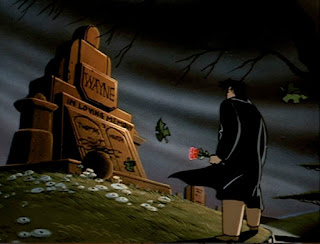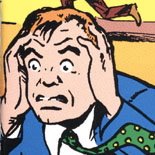Batman: The Animated Series Re-Watch: Episode Twenty Eight: Dreams in Darkness
Plot: Batman is locked up in Arkham. A flashback reveals he was exposed to fear gas, crashed the Batmobile and was imprisoned by the well-meaning Arkham staff. Now Batman must escape his straightjacket and stop the Scarecrow from infecting the whole city with fear.
Another psychologically interesting episode of Batman, one that lays his flaws on table, specifically his inability to trust others. As he did in Appointment in Crime Alley, Batman cannot see a crime about to be committed and not step in, even when leaving the problem for the police is probably the right thing to do.
After being exposed to the fear gas, Dr. Wu gives Batman a clear choice: he can take the antidote, recover for two days, and let ANYONE ELSE, specifically Robin or Commissioner Gordon, handle the Scarecrow in the meantime, or he can delay recovery and try to take care of the Scarecrow himself. And Batman makes the obviously wrong choice. In trying to ignore the problem, Batman nearly kills himself in a car crash and gets himself locked up, cut off from his allies, all while the Scarecrow comes closer to launching his attack.
Notably, in the narration that covers the first half of the episode, Batman admits to two mistakes (he's wrong about the nature of the robbery, and he's wrong about the effect of the gas), but he never admits it was a mistake to drive to Arkham while under the influence of a powerful hallucinogen.
 The two major dream sequences: running through a twisted Crime Alley, impotent to stop his parents from literally walking into a gun, and fighting his greatest foes as they shift from one into another, and into Alfred and Robin, suggest why Batman is hesitant to trust others. First, no police saved his parents, and if he can't save them, no else even seems to try. And secondly, Batman seems to fear betrayal from those closest to him, that their attempt to drag him from the shadows will actually doom him.
The two major dream sequences: running through a twisted Crime Alley, impotent to stop his parents from literally walking into a gun, and fighting his greatest foes as they shift from one into another, and into Alfred and Robin, suggest why Batman is hesitant to trust others. First, no police saved his parents, and if he can't save them, no else even seems to try. And secondly, Batman seems to fear betrayal from those closest to him, that their attempt to drag him from the shadows will actually doom him.Which makes the final image so psychologically interesting. After rejecting Alfred and Dr. Wu's offers of help earlier, Bruce has submitted to Wu's treatment, administered by Alfred, as he sleeps in the Batcave (and not, say, his very nice bed in this very nice room upstairs). Bruce actually thanks Alfred, saying "It's good to know I'm safe here," so Bruce is learning to accept that he needs help.
Then a very angelic looking bat casts a very Batman-like shadow on Bruce, which suggests that the Batman persona, like Alfred, is a shield that protects Bruce while he recovers. Just as it's the screech of a bat that wakes Bruce from his worst delusion of the episode, being Batman isn't a madness. Being Batman is what keeps Bruce sane and helps him recover from the trauma of the loss of his parents.
That one of Batman's greatest is his villains is new. We've seen his fear of the loss of his parents before, and we saw in The Forgotten that the Joker haunts Batman's thoughts, but now we see a fear of new villains, Poison Ivy and Two-Face, whom Batman has only fought once (and it's only implied that Batman has fought the Penguin before I've Got Batman in my Basement.) We are watching a transition from Batman encountering villains for the first time in the middle of schemes unrelated to him, to villains like the Scarecrow actually setting traps for Batman, targeting him directly. The Joker has been doing that since his first episode, but this episode (and The Clock King) implies more villains are going to act like the Joker, and Batman's job is only going to get harder from hear on out.
 Certainly, the Scarecrow is much better here than he has been before. He's better motivated, without the circular reasoning of using fear attacks in revenge for not being able to use fear attacks, or using fear attacks to make money to afford to be able to use fear attacks. Here, he simply wants to panic everybody in Gotham, just to find out what would happen if he did. Perfect villainous motivation. In addition to that, he's clever about his plan. He baits Batman into a trap before trying to scare everyone. He throws off everybody's suspicion by NOT escaping from Arkham, merely running his scheme from its basement. And Henry Polic II seems to have gotten the Scarecrow's voice down to the right tone of erudite menace. He no longer sounds like an English professor playing a Batman rogue for Halloween, but rather a truly brilliant and sadistic man, who likes to wear a scary mask. He also has a fabulous pocket watch (which Batman breaks).
Certainly, the Scarecrow is much better here than he has been before. He's better motivated, without the circular reasoning of using fear attacks in revenge for not being able to use fear attacks, or using fear attacks to make money to afford to be able to use fear attacks. Here, he simply wants to panic everybody in Gotham, just to find out what would happen if he did. Perfect villainous motivation. In addition to that, he's clever about his plan. He baits Batman into a trap before trying to scare everyone. He throws off everybody's suspicion by NOT escaping from Arkham, merely running his scheme from its basement. And Henry Polic II seems to have gotten the Scarecrow's voice down to the right tone of erudite menace. He no longer sounds like an English professor playing a Batman rogue for Halloween, but rather a truly brilliant and sadistic man, who likes to wear a scary mask. He also has a fabulous pocket watch (which Batman breaks).Unfortunately, in order for the episode to work, Dr. Bartholomew, head of Arkham, has to be completely negligently incompetent. The Animated Series has a dim view of psychology, and psychiatrists and psychologists on the show range from merely ineffective, like Harvey Dent's therapist, to the outright evil, like Professor Jonathan Crane himself, and while not malicious, Dr. Bartholomew totally misdiagnoses Batman while he ignores everything Batman has to say.
The episode shows Batman DOES have problems trusting people and probably could use therapy, but that would require a psychiatrist who actually listens to him. Instead, Bartholomew diagnoses Batman off just the fact that Batman came to Arkham as someone who cannot tell reality from delusion, when in fact, being Batman, being a detective, is exactly what allows him to see through his hallucinations. But Bartholomew refuses to believe that Batman's hallucinations are gas-induced, calling it "supposed gas", as if the Scarecrow hasn't been using fear gas from the beginning. He refuses to contact Gordon or Dr. Wu like Batman asks, and even after discovering the Scarecrow missing, which proves Batman is right, insists on keeping Batman locked up.
The worst moments is when he chides Batman for not using the villains' real names, which is doubly stupid. I don't think Batman has yet referred to Two-Face or Poison Ivy as anything other than "Harvey" and "Isley", and NO ONE calls the Joker anything but the Joker. His reference to "Jack Napier" is the Joker's real name from the Burton film, but it's never mentioned again in this cartoon. Also, who is Bartholomew to talk? He's the one who leaves them in their costumes, reinforcing their villainous personas over their civilian ones.
Similarly, his explanation that the orderly cannot remove Batman's mask because Batman might become catatonic is utterly ridiculous. How are you supposed contact his loved ones if you don't know who he is? How do you know it's really Batman and not some idiot in a Batman costume? And how could it hurt to take off his mask while he's out of it, if you put it back on before he wakes up? Maybe Batman would learn to trust people, if he wasn't surrounded by idiots.
 The other problem this episode has, though no fault of its own, is airing after the inferior Fear of Victory. All of talk about who could have used fear gas is silly, it's obviously the Scarecrow, who we've seen is the only one who uses that weapon. And Bartholomew's claims that Scarecrow couldn't have escaped seem hollow since we've already seen that he can. (If they wouldn't have seemed hollow before, since the first time we see Arkham is watching the Joker escape from it on the back of a rocket Christmas tree). Plus, this episode could have been the first time we see inside Arkham, but that was already used in the best scene in Fear of Victory. This episode almost feels like the head writers saw that scene, realized that should be an entire episode and decided to make this one, only they forgot to tell the guys behind Fear of Victory to stop work.
The other problem this episode has, though no fault of its own, is airing after the inferior Fear of Victory. All of talk about who could have used fear gas is silly, it's obviously the Scarecrow, who we've seen is the only one who uses that weapon. And Bartholomew's claims that Scarecrow couldn't have escaped seem hollow since we've already seen that he can. (If they wouldn't have seemed hollow before, since the first time we see Arkham is watching the Joker escape from it on the back of a rocket Christmas tree). Plus, this episode could have been the first time we see inside Arkham, but that was already used in the best scene in Fear of Victory. This episode almost feels like the head writers saw that scene, realized that should be an entire episode and decided to make this one, only they forgot to tell the guys behind Fear of Victory to stop work.(Strangely, the interior of Arkham in Fear of Victory, with glass enclosed cells of concrete, looks very different from the one in Dreams in Darkness, where cells are made of stone and closed by iron doors. Considering we also don't see any other famous Arkham inmates, except in dreams, it's possible that Batman was thrown into the arcane practices wing, while the costumed villains are kept somewhere else.)
That said, once you get past those problems, this is a pretty great episode designed to get us inside Batman's head. The noirish narration, the superb dream sequences, the flawed hero, and the comforting image of the bat protecting Batman, closes out the season with style.


















